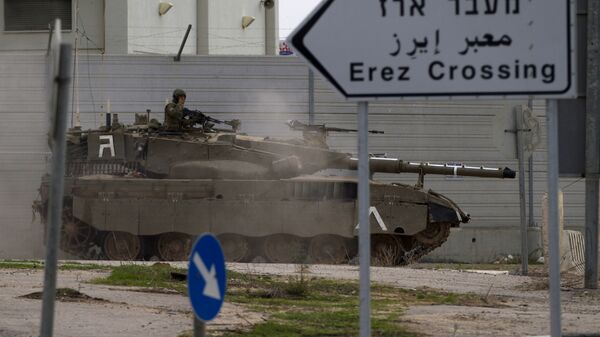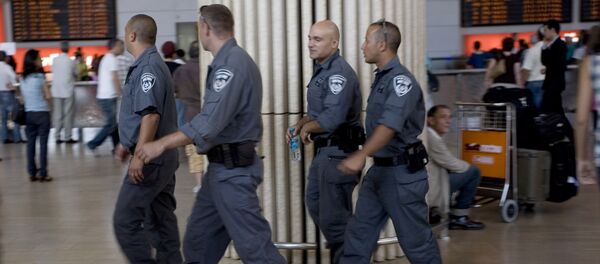The Human Rights Watch (HRW) 47-page report, Unwilling or Unable: Israeli Restrictions on Travel to and from Gaza for Human Rights Workers, documents the country's systematic ban on human rights workers from traveling to and from Gaza, even when security services make no claims against them as individuals. As a result, HRW said the International Criminal Court's (ICC) prosecutor's office should take note of the restrictions in the context of its ongoing preliminary examination of the Palestine situation.
"If Israel wants the prosecutor to take seriously its argument that its criminal investigations are adequate, a good first step would be to allow human rights researchers to bring relevant information to light. Impeding the work of human rights groups raises questions not just about the willingness of Israel's military authorities to conduct genuine investigations, but also their ability to do so," said Sari Bashi, Israel and Palestine Advocacy Director at HRW.
For the last two decades, the report states, Israel has kept the Gaza Strip mostly closed, preventing Palestinians from leaving Gaza to pursue educational and professional opportunities, family visits and reunification, as well as medical care.
Israel/Palestine: Rights Workers Denied Gaza Access https://t.co/1QM7S5o7EZ
— Human Rights Watch (@hrw) April 3, 2017
Hamas authorities in Gaza have also been significantly tightening restrictions on passage between Gaza and Israel, following the assassination of a senior militant that Hamas blames on Israel.
Hamas says it wants to stop killers from entering or fleeing Gaza, and are blocking all travel out of the area unless it's for urgent medical care or to visit relatives in Israeli prisons. Males between the ages of 15 and 45 are blocked from traveling altogether. These "harsh and disproportionate" restrictions are preventing young men from reaching badly needed medical care, and family visits to critically ill relatives or for funerals are among the kinds of travel blocked entirely.
The ICC prosecutor's ongoing preliminary examination of the Palestine situation includes analyzing whether crimes falling under ICC jurisdiction have been committed, whether those crimes are sufficiently grave to merit the court's attention, whether national authorities are genuinely carrying out credible investigations and, if appropriate, weighing prosecutions in cases being considered for investigation by the ICC.
Israeli authorities claim their investigations meet international standards, and that while criminal investigators do not enter Gaza, they rely on human rights organizations to alert them of potential violations, provide documentary and forensic evidence, and facilitate witness testimony.
Since 2008, Human Rights Watch has only once received permission to get foreign staff into Gaza via Israel — during a September 2016 visit, which the Israeli authorities characterized as exceptional. Neither Human Rights Watch nor Amnesty International has been able to get staff into Gaza via Egypt since 2012.
Moreover, HRW charges Hamas do not adequately protect human rights workers from retribution, and in some cases arrest and harass those who criticize Hamas or the activities of armed groups in Gaza. The inability to get foreign human rights workers into and out of Gaza, the rights group states, also limits the ability of human rights groups to document Palestinian abuses inside Gaza, because of safety concerns for local staff.
In its response to the report, the Israeli military attorney general's office stated it attributes "great importance" to its "extensive and daily dialogue" with human rights organizations, whose reporting, it said, provides important input into its decisions about whether to open a criminal investigation or how to obtain a fuller picture in existing investigations. However, the office criticized documentation by human rights organizations as suffering from "methodological, factual and legal flaws" and, in some cases, "a clear bias." Travel restrictions on human rights workers, it said, were "unavoidable… due to weighty security and political considerations."
The office did not address why human rights workers should not be added to the category of people who, despite the security situation, are permitted to travel between Gaza, Israel, and the West Bank, such as football players, senior merchants and VIPs.
"Israel, Hamas and Egypt should change their policies to protect the vital work of human rights groups seeking to protect Palestinians and Israelis from abuses by the authorities and armed groups," Bashi concluded.
Israel's battles against its critics has increased significantly in intensity since the start of 2016, with Knesset passing a law in July of that year, targeting human right groups, imposing onerous reporting requirements that burden their activities. In August of the same year, five US activists aiming to investigate living conditions for Palestinians in Israeli-occupied areas were arrested, detained and then deported, as well as being banned from ever returning. In December, African theologian Isabel Phiri was detained over claims the organization for which she works, World Council of Churches, supported sanctions against Israel.
Israel: Human Rights Watch Denied Work Permit https://t.co/kVjg7EyogF "Not a real human rights group, the organization said today." #qanda
— Prince Fed up (@somuchbullsh) February 26, 2017
Palestinian rights defenders have also received anonymous death threats, been subject to travel restrictions and even arrested and charged on questionable grounds.
In February 2017, the government refused to issue visas to Human Rights Watch (HRW) staff, accusing the group of having an "extreme, hostile and anti-Israel agenda."
The organization described the move as "ominous," and a sign the state had "no appetite" for serious scrutiny of its human rights record.




